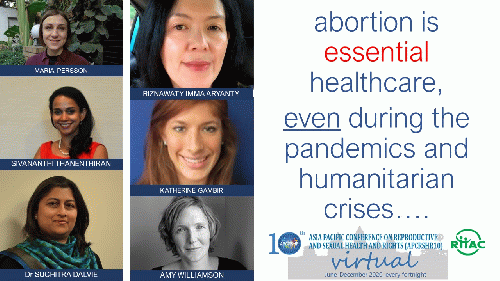Shobha Shukla - CNS

Rights-based access to safe abortion is essential in normal times as well as during humanitarian crises
(Image by CNS) Details DMCA
...so goes an old common blessing given to an Indian bride, talks of gender equality notwithstanding. While the small family norm slogan of 'hum do, hamare do' (we two, ours two) has rubbed in well the penchant for begetting at least one son has not waned.
Many
modern Indian women find their womanhood incomplete without begetting a son. I
know of several highly educated and professionally qualified young Indian women
who heaved a sigh of relief and smug satisfaction on having a boy as their
first or second born. A complete Indian family is envisaged as one with two
kids- at least one of who ought be a son.
This is what centuries of patriarchy entrenched in our society has done to our
psyche, which even a Harvard degree is unable to wipe out. One shudders to
think of the plight of the less privileged ones. No wonder India's sex ratio at
birth stands at 919 girls for every 1000 boys. While the Pre-conception and
Prenatal Diagnostic Techniques (Prohibition of Sex Selection) Act prohibits
sex-selection of the foetus, its enforcement is lax, resulting in high
incidences of female foeticide in many states. Ironically, those very families
who have no qualms about killing the female foetus, revel in worshipping female
deities with great pomp and show.
Having access to reproductive justice that entails "the human right to
maintain personal bodily autonomy, have children, not have children, and parent
the children in safe and sustainable communities" is a far cry for most
women, not only in India but in many countries of the Asia Pacific region.
The term reproductive justice was coined and formulated as an organizing
framework by a group of Black women in Chicago in 1994, just ahead of the International
Conference on Population and Development (ICPD) in Cairo.
Reproductive justice links reproductive rights (legal rights to access reproductive health care services including abortion and birth control) with the social, political and economic inequalities that affect a woman's ability to access reproductive health care services. Core components of reproductive justice include equal access to safe abortion, affordable contraceptives and comprehensive sex education, as well as freedom from sexual violence.
A fiery and
enlightened panel of women activists aired their views on these issues during a
recent online session of the 10th Asia Pacific Conference on Reproductive and
Sexual Health and Rights (APCRSHR10), focussing on safe abortion in the region.
Mortality due to unsafe abortions still remains high at 13% of all maternal
deaths in South East and South Asia. Abortion is illegal in 3 Asian countries-
Iraq, Laos and Philippines. 17 countries allow abortion without restrictions
and others allow it only under certain conditions. But even in countries like
Cambodia, India and Nepal, that have liberal abortion laws, many women continue
to face a host of barriers to obtaining safe, legal procedures. In Thailand,
despite access to safe abortion services and contraceptives, teenage pregnancy
remains a challenge. Stigma, coupled with lack of information, makes these
services more inaccessible to unmarried women.
Sivananthi Thanenthiran, Executive Director, ARROW (Asian-Pacific Resource and
Research Centre for Women), blames it upon the growing influence of religious
fundamentalism and its anti-gender ideology with the rise in right wing
governments.
"Extremist ideologies thrive on asserting control over women's bodies,
autonomy, sexuality and their daily lives. This confluence of conservative
religious, cultural and customary practices is often interlinked with the
pursuit of power. Criminalisation of abortion is a tool of patriarchy and
structural racism. Safe abortion for women is not just about choice, but also
about access. Governments should eliminate all legal barriers that limit women's
access to sexual and reproductive health services, commodities and information,
including access to safe abortion. Generating evidence based data on abortion
and related issues through a rights-based analytical framework is essential to
influence policy and strengthen advocacy and accountability", she asserts.
Dr Suchitra Dalvie, co-founder and Coordinator of the Asia Safe Abortion
Partnership, roots for recognizing the political significance of safe
self-managed abortions that governments should make available to pregnant women
as a valid and safe choice, and not in situations where they are forced to do
it underground. According to her, a pregnant woman should have enough accurate
information to be able to self-assess her pregnancy, self-procure the pills and
self-conduct the process of abortion in a location of her choice without having
to visit a medical facility. She should also be able to access a healthcare
provider if need be at any stage of the process.
(Note: You can view every article as one long page if you sign up as an Advocate Member, or higher).





